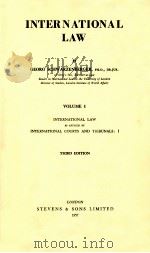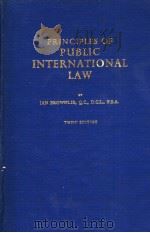《THIRD PARTIES IN INTERNATIONAL LAW》
| 作者 | 编者 |
|---|---|
| 出版 | CLARENDON PRESS·OXFORD |
| 参考页数 | 385 |
| 出版时间 | 1993(求助前请核对) 目录预览 |
| ISBN号 | 0198257155 — 求助条款 |
| PDF编号 | 812893988(仅供预览,未存储实际文件) |
| 求助格式 | 扫描PDF(若分多册发行,每次仅能受理1册) |

1 The Problem1
1.Introduction1
2.Identification of Third Parties7
2.1 States as third parties7
2.2 International organizations as third parties11
2.3 Individuals as third parties13
3.Third Parties in International Disputes and Conflicts15
4.Rights,Obligations,and Interests18
PART Ⅰ.TREATIES AND THIRD PARTIES25
2 States as Third Parties to Treaties:Formal Prescriptions25
1.The Current Status of the Pacta Tertiis Rule25
2.General Legal Prescription on Treaties and Third Parties26
2.1 Before the Vienna Convention on the Law of Treaties26
2.2 Drafting the Vienna Convention on the Law of Treaties29
2.3 The Vienna Convention on the Law of Treaties:Articles 34-3832
2.4 Exclusions from the Vienna Convention35
2.5 Other Articles of the Vienna Convention37
2.6 Comments on the Vienna Convention39
3.Specific Legal Prescription44
3.1 Interlocking arrangements:Treaties of Guarantee44
3.1.1 The Peace Treaty between Egypt and Israel45
3.1.2 The Afghanistan Peace Treaties and Guarantees46
3.2 Other Treaty Devices47
3.2.1 Protocols47
3.2.2 Reciprocity50
3 States As Third Parties to Treaties:Claims by and against Third Party States52
1.Claims of Participation52
1.1 Claims of accession52
1.2 Claims of adherence54
1.3 Claims of assignment57
1.4 Claims of third party beneficiary62
1.5 Claims of agency64
1.6 Claims of newly independent States67
2.Claims of Non-participation68
3.Claims for Performance69
4.Claims that a Treaty Should not be Entered into or Performed71
4.1 Treaties conflicting with the rights of third States71
4.2 Conflicting treaties73
4.3 Surrender of treaty-making power81
5.Claims of Amendment82
6.Claims Relating to International Communications84
6.1 Interoceanic canals84
6.2 Straits86
4 International Organizations as Third Parties to Treaties89
1.International Organizations as Third Parties89
2.The Vienna Convention on The Law of Treaties between States and International Organizations90
3.Claims by Member States against International Organizations94
3.1 Claims that organizations are bound by their constitutive treaties94
3.2 Claims that the actions of the organization are invalid96
4.Claims by International Organizations against Member States99
4.1 Claims that member States acted contrary to the constitutive treaty99
4.2 Claims that member States are estopped from denying an extension of institutional power101
4.3 Claims of status102
5.Options Available to Dissentient Member States104
6.Claims by Third Parties with Respect to International Organizations106
6.1 The position of third parties106
6.2 Third party procedural claims108
7.Third Party Claims against the Member States of an Organization109
5 Individuals as Third Parties to Treaties120
1.Introduction120
2.States'Claims on Behalf of Individuals122
3.Individuals'Claims before National Courts123
4.Individuals'Claims to Status129
5.Claims Based upon Human Rights and Humanitarian Principles131
6 Conclusions to Part Ⅰ:The Pacta Tertiis Rule in Modern International Law134
1.Introduction134
2.The Vienna Convention on the Law of Treaties134
3.The Displacement of Treaty Law138
4.Analogy to Municipal Law Devices141
5.Conclusions142
PART Ⅱ.INTERNATIONAL JUDICIAL AND ARBITRAL PROCEDURE AND THIRD PARTIES147
7 Intervention before the International Court of Justice:Articles 62 and 63 of the Statute of the Court147
1.Introduction:The Bilateral Model of Adversary Proceedings147
2.Legal Basis for Intervention before the International Court of Justice150
2.1 Articles 62 and 63 of the Statute of the Court150
2.2 Article 62 of the Statute of the Court152
2.3 Article 63 of the Statute of the Court153
2.4 Relationship between Articles 62 and 63154
2.5 Relationship with Article 59155
3.Interpretation of Article 62 by the International Court160
3.1 Interest of a legal nature160
3.2 'May be affected'163
3.3 Purposes of Intervention166
3.3.1 Precise nature of expressed purpose166
3.3.2 To join interests with one of the parties170
3.3.3 To introduce a peripheral matter170
3.3.4 To assist the Court171
3.3.5 Improper purposes172
4.Jurisdiction for Intervention172
4.1 No jurisdictional requirement for intervention172
4.2 Rights of the intervening State175
5.Interpretation of Article 63 by the International Court178
5.1 Purposes of intervention under Article 63178
5.2 Jurisdictional link under Article 63180
6.Policies of Intervention180
6.1 Policies under Article 62181
6.2 Policies under Article 63184
8 Multiparty Disputes:Intervention and Indispensable Parties before the International Court of Justice186
1.Introduction186
2.Party and Third Party Strategies186
2.1 Notification of conventions under Article 63186
2.2 To request or block access to pleadings188
2.3 To request or object to intervention190
2.4 Timing of a claim of intervention195
3.Decision Not to Intervene:Indispensable Parties198
4.Other Options Available to Third Parties212
4.1 Where other proceedings have been commenced212
4.1.1 Commencement of separate proceedings212
4.1.2 Joinder of proceedings213
4.2 Where no other proceedings have been commenced213
4.2.1 Designation as a third state213
4.2.2 Proceedings in the public interest214
4.2.3 To seek an advisory opinion216
9 Intervention before the European Court of Justice218
1.The Legal Framework218
2.The Practice of Intervention before the European Court219
10 Other Third Party Procedures before International Adjudicative Tribunals226
1.The International Court of Justice226
1.1 Information from third party States226
1.2 Information from third party organizations229
1.3 Information from third party individuals232
2.The European Court of Human Rights237
2.1 Individual standing before the Court237
2.2 Presentation of information by non-parties238
3.The Inter-American Court of Human Rights242
4.Interpretation of Treaties Affecting Non-parties to an Organization244
11 Third Parties before International Arbitral Tribunals247
1.Introduction:Differing Models of Arbitration247
2.Party Autonomy in International Arbitration249
3.Claims that an Arbitral Award Prejudices Third Party251
3.1 Claims by parties to the award251
3.2 Claims by third parties254
4.Claims to Enforce the Arbitration Agreement257
4.1 Claims that an arbitral agreement be enforced against a third party257
4.2 Third party prejudiced by failure to seek arbitration262
5.Third Party Claims that Rights Have Been Bestowed by the Arbitral Agreement262
5.1 Third party claims of accession262
5.2 Third party claims of intervention265
6.Third Party Claims that a Tribunal Should Not Hear a Case272
12 Conclusions To Part Ⅱ:Third Parties in International Proceedings275
1.Third Party Procedural Claims275
2.Third Party Procedures in the Public Interest282
PART Ⅲ.THIRD PARTIES AND INTERNATIONAL CRIMES:ARMED CONFLICT291
13 Third Party Response to Armed Conflict and Acts of Aggression:Neutrality291
1.Introduction291
2.Policies with Respect to Third Parties to Armed Conflict294
3.Identifying the Aggressor296
4.Unilateral Third Party Claims:Neutrality299
4.1 Neutrality under the United Nations Charter299
4.2 Claims of neutrality where there has been no Security Council determination of aggression303
4.3 Claims of neutrality where there has been a Security Council determination of aggression311
14 Third Party Unilateral and Collective Responses to Armed Conflict315
1.Unilateral Third Party Responses315
1.1 Non-forcible counter-measures315
1.2 Collective self-defence318
1.3 Counter-intervention325
2.Collective Response to an Act of Aggression:Constructive Injury to Third Parties as Members of the International Community331
15 Conclusions to Part Ⅲ:Third Parties and International Crimes343
1.Introduction343
2.Third Party Claims in International Armed Conflict344
16 Conclusions349
Bibliography357
Index377
1993《THIRD PARTIES IN INTERNATIONAL LAW》由于是年代较久的资料都绝版了,几乎不可能购买到实物。如果大家为了学习确实需要,可向博主求助其电子版PDF文件(由 1993 CLARENDON PRESS·OXFORD 出版的版本) 。对合法合规的求助,我会当即受理并将下载地址发送给你。
高度相关资料
-

- STUDIES IN INTERNATIONAL LAW
- 1973 CLARENDON PRESS
-

- INTERNATIONAL LAW VOLUME 1 THIRD EDITION
- 1957 STEVENS & SONS LIMITED
-

- GOOD FAITH IN INTERNATIONAL LAW
- 1991 DARTMOUTH
-

- RECOGNITION IN INTERNATIONAL LAW
- 1947 CAMBRIDGE AT THE UNIVERSITY PRESS
-

- INTERNATIONAL LAW IN NATIONAL COURTS
- 1932 COLUMBIA UNIVERSITY PRESS
-

- GOVERNMENTAL ILLEGITIMACY IN INTERNATIONAL LAW
- 1999 CLARENDON PRESS
-

- SELF-DEFENCE IN INTERNATIONAL LAW
- 1958 MANCHESTER UNIVERSITY PRESS
-

- THE RESPONSIBILITY OF INTERNATIONAL ORGANIZATIONS TOWARD THIRD PARTIES
- 1995 MARTINUS NIJHOFF PUBLISHIERS
-

- BASIC DOCUMENTS IN INTERNATIONAL LAW
- 1972 OXFORD
-

- LOCAL REMEDIES IN INTERNATIONAL LAW
- 1990 CAMBRIDGE UNIVERSITY PRESS
-

- Studies In International Space Law
- 1997 Clarendon Press
-

- Essays in Private International Law
- 1993 Clarendon Press
-

- Justice in International Law
- 1994 Grotius Publications
-

- THE LAW OF INTERNATIONAL INSTITUTIONS THIRD EDITION
- 1975 STEVENS & SONS
提示:百度云已更名为百度网盘(百度盘),天翼云盘、微盘下载地址……暂未提供。➥ PDF文字可复制化或转WORD
